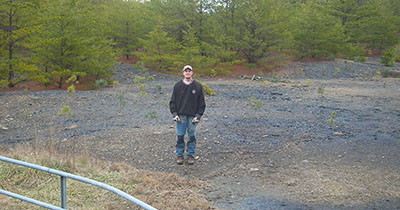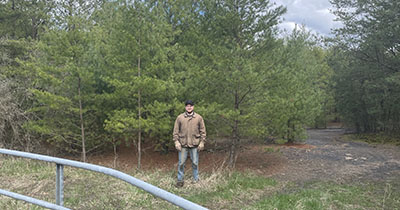For Earth Day this year, I’m taking a moment to reflect on the progress we’ve made seeking to restore and care for creation.
Perhaps one of the greatest challenges in working on values-driven shareholder advocacy in my role at Praxis Mutual Funds is staying positive and constructive when engaging companies on seemingly intractable issues. Profound environmental crises, such as climate change, resource depletion, toxic chemical proliferation, and biodiversity loss, appear to be converging, and the steps taken so far to ease their impact have been insufficient at best.
For much of my young adulthood and career, I embodied the notion that our unsustainable systems need to fundamentally change – and quickly – or else creation would face catastrophic consequences. This contributed to a great sense of urgency and the need to pursue a frantic pace of corporate engagement. While my thinking was technically correct, the high stakes approach I took was exhausting and sometimes overwhelming. Against the backdrop of slow progress and negative trends, thoughts of hopelessness and, at worst, disengagement, weren’t far away.
As I’ve matured, I think I’ve gained wisdom in approaching the problems of our time. I now routinely ask myself: What can I do with what I control? Accepting a limited role can feel both manageable and freeing. I’ve even come to welcome the idea that I may contribute to change that I may not fully realize in my lifetime.
I also ask: How can I acknowledge gradual success? Despite the setbacks and frustrations, progress does occur, and it’s important to document it. Gaining a sense of achievement can go a long way toward facilitating future accomplishments. I’ve also learned through my advocacy experience that small steps can lead to big leaps.
My changing perspective has been influenced in part by my own conservation work.
Part of the land where my family lives was strip-mined for coal in the 1950s. The mine provided a few jobs for a few years and was promptly abandoned when the coal seams were exhausted. What was once rolling farmland and forest now more closely resembled the surface of the moon, with deep gullies, high walls, and persistent erosion. With the topsoil buried underground, the land remained largely devoid of vegetation in the following decades.
In the early 1990s, state contractors planted a few thousand pine and black locust trees through a program that assisted with the reclamation of old mine lands. Many trees succumbed to the harsh conditions of the strip mine, but this effort led to some patches of trees taking root. By the time I bought the property in 2007, some areas had begun recovering into young forest while large sections of moonscape remained.
Chris standing by pine seedling.
In the past 15 years, with the help of family and friends, I have planted over 10,000 trees to re-forest the land, erected micro-dams to mitigate erosion, and practiced forestry work to limit the proliferation of invasive species. All the barren spaces have been planted at least twice. The progress isn’t always quick or linear, but it is real.
2009 - Chris in front of trees he planted.
Chris in front of the same trees in 2024.
I try to draw lessons from my reforestation project for my shareholder advocacy work. While it’s important to keep ideals and long-term goals, guiding my way, incremental progress toward those goals isn’t just symbolic, it’s how those goals are practically achieved. For instance, small changes to corporate policy that may seem insignificant – such as a 10% reduction in emissions or access to paid sick leave for employees – can make a difference to millions of people. And they often lead to more impactful changes.
Examples of incremental success with shareholder advocacy include:
- Environmental Justice: In 2009, Praxis participated in a shareholder advocate learning tour of Mossville, La., where residents were surrounded by chemical plants and lived with polluted air and water, and although many wanted to move, they were unable to because their homes had virtually no value due to the pollution. At that time, shareholders began initial research and communication with companies, including Sasol, with input from local grassroots organizations. In 2012, Sasol announced a major expansion of its gas-to-liquid facility near Mossville, posing additional threats to the health of residents, and shareholders began direct advocacy with Sasol on behalf of residents, using relationships formed in prior years to bolster their case. Following this shareholder action, Sasol announced a voluntary property purchase program for residents affected by the company’s growth plans in 2013. Mossville residents were generally satisfied with the offer, and most took it, providing them with compensation and the means to move elsewhere.
- Climate Change: Praxis joined other shareholders in formal advocacy with American Electric Power (AEP) in 2016 on climate change issues, including emissions reduction goals and Just Transition. This advocacy led to several small commitments to pollution reduction and help for displaced workers. In 2021, AEP pledged to reach net zero carbon emissions by 2050, a move championed by shareholders. This commitment was subsequently moved forward to 2045, and AEP produced a strong, comprehensive Just Transition report in 2022, which will serve as its guide to supporting workers and communities affected by the transition to cleaner energy.
As people of God committed to sustainability and justice, we are not individually responsible for all the problems in the world, nor can we right all wrongs. I believe our mission is to work toward the wholeness of creation with the time and resources we are given, while honoring milestones along the way.
Plant a tree, and marvel when its leaves emerge for the first time. Take satisfaction in recycling items that stay out of the landfill. Restore native plants to your property and observe the diversity of creatures that return. Celebrate incremental progress, let it provide motivation and energy, and keep working toward the greater goal.

